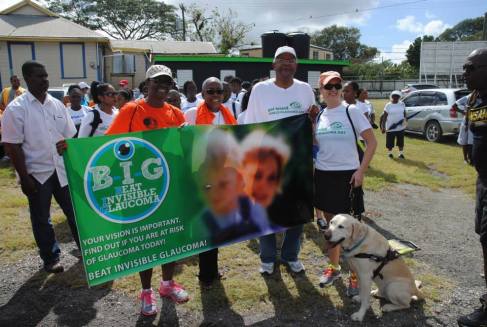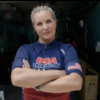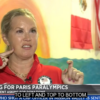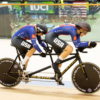For ONCE in my life, I’m at a loss for words. What I have seen, experienced and been surrounded by for the past two weeks of travel would be done little justice with mere prose. I spent a week in Florida, speaking to supporters of Guiding Eyes for the Blind, the school that gave me my wonderful Labrador Guide Dog, Elvis. There I hosted elaborate wine tastings attended by folks of impressive means who are incredible philanthropists.
So you can imagine my shock and the complete turnaround when I landed in Antigua, where the airport was surrounded by lush Palm trees and tropical vegetation and brightly colored bougainvillea, yet further down the road bore the signs of immense poverty and despair. Emaciated stray dogs lined the country roads, workers waiting for the tiny mini bus to their jobs at the once-full resorts that in year’s past were packed with tourists, now hoped to at least keep their low wage employment. Yet here, everyone had a smile and a hand-shake for me and my mom.
You see, we were honored guests. Optometrist, philanthropist and civil-rights advocate Dr. Jillia Bird, a household name on this island of 10,000 residents brought me here to help change the fate of an entire nation of people. NO easy or small task, mind you. It was World Glaucoma Week, and Dr. Bird aimed to educate and shine a spotlight on this Pandemic going on in the tropics. Here, 1 in 10 African American adults over the age of 40 have Open-Angle Glaucoma. This type of Glaucoma is extremely treatable when caught early, although there is no cure. The diet of the islanders, heavy in sugar due to the prevalence of so much fresh fruit and juices, often leads to diabetes, a high risk-factor for this type of eye disease. We were here to change that statistic, one person at a time.
I met Dr. Bird online in my Glaucoma Support Group on Facebook. For the past two years she has listened, laughed, cried and cheered me on through my many surgeries, experimental treatments, pain and triathlons. So when she invited me to come speak in Antigua about my life with Glaucoma as a patient who has ‘been there, done that’, I jumped at the chance to help so many others with my disease.
The first night was magical, with dancing, reggae and new friends overlooking Saint Kitts and Nevis from a historic fort. The next morning, the ‘work’ began. Jillia had organized a ‘March for Sight’ on International Women’s Day to kick off World Glaucoma Week. We were joined by more than 600 people to raise awareness for this incredible event. There were members of the Lion’s Club, the Youth Council, Powerful Women’s group, a marching band, Girl Scouts, Medical Students, Nurses, and hundreds of others. I had the honor of marching at the very front of the parade beside the president of the World Glaucoma Patient Association and the Prime Minister of Antigua! My guide dog Elvis was suffering from the sudden transition from cold New England weather of 20 degrees F, to 85 degrees on the streets of Saint John’s, but he managed just fine when we returned to the start of the parade route, and dozens of children surrounded him and covered him with pats and kisses and dog treats. Afterwards, we returned to our private beach at the hotel and hopped in the turquoise waters for a good game of fetch and a swim. Overall, not a bad day’s work for a guide dog!
Jillia kindly set me up at the most beautiful gym called the Antigua Athletic Club. There I met wonderful locals and ex-pats who were runners, swimmers, and yoga buffs. I got a tour of the facility by the most handsome personal trainer, a man named Orson who had heard about my arrival. He shared his own story of personal triumph over addiction many years ago, and how becoming a professional body builder and motivational speaker and mentor to newly recovered addicts changed his life. We were fast friends. The club manager approached me and asked if I had time in my schedule to speak to the kids about the sport of Para Triathlon and Glaucoma and Elvis, and OF COURSE I said yes. I even suggested I host a clinic for the swim team. Was I getting giddy? You BET I was!
That night Dr. Bird, fellow Canadian Glaucoma Patient Jenia and I spoke at what is known as the Medical Benefits Scheme, which is their equivalent of a government health center. Dr Bird gave a riveting talk about the prevalence of Open Angle Glaucoma in the Caribbean, and implored the large group of attendees to get their eyes tested. Jenia spoke about a fascinating study she participated in in Canada, where a sensory contact lens was inserted into her eye to take a 24-hour reading of her inter ocular pressure. And finally, I spoke about how Glaucoma may have taken my sight, but it has not taken away my quality of life, and urged the group to be active physically, be an advocate for themselves at their doctor’s offices, and to realize that Glaucoma is not a death sentence.
One of the MANY new things I learned about Glaucoma this week is this: Glaucoma is not ONE disease, it is a FAMILY of eye diseases, affecting many people differently. It is NOT always associated with high inter ocular pressure as previously thought. For MOST patients, there are NO SYMPTOMS of Glaucoma, often affecting the periphery of the retina or optic nerve first, causing the patient to see perfectly clearly although they are losing their vision to the side before it’s too late. The only way to test for Glaucoma is to have your IOP tested once a year and a visual field exam to determine if you have any blind spots. Having a good thorough medical history helps doctors determine your risk factors for Glaucoma. Being black and having circulatory issues, diabetes, or migraines can predispose you to Glaucoma. If caught in the early stages, it is extremely manageable, and most people do NOT go blind. When someone has circulatory issues or diabetes, the TEENY blood vessels in their hands, feet, eyes, and kidneys are affected the most, causing them to die off if their disease is not well managed. This vascular death begins the spiral of vision loss.
The following day I was on ABS TV, on a show called “Good Morning Antigua’ Talking about my journey and how the islanders can prevent this disease from taking hold of their lives. What a difference between their studio and those we have here! The troopers/ aka news anchors worked in primitive conditions, with water dangerously dripping into buckets next to the wires for the cameras. I was more nervous about being electrocuted than being interviewed!
From the TV station, we headed over to the TN Kirnon School for the Deaf and Blind, and spoke to more than 100 able-bodied students, and to the small group of blind kids. They were fascinated by Elvis, as dogs on Antigua were generally NOT pets, but used for protection, and many were afraid to touch him. They were in awe of the fact that he knows nearly 150 words, and watched him take me carefully around the school yard, avoiding a large ditch, helping me find the stairs, and going through hand commands instead of the usual verbal ones. One little girl lost her sight to Congenital Cataracts, and I allowed her to feel what it was like to be guided by Elvis instead of her white cane. She was so excited by his happily wagging tail, and in shock that he could help her up the steps to her classroom. I was in tears. Her Information Technology teacher, Lisa Hixon, blind herself from Retinitis Pigmentosa ( a degenerative eye disease similar to mine) showed us the computers they use at the school to work with the blind and visually impaired students. They had a CCTV to enlarge books, and the young student read to us a book about her grandma thanks to the huge print and varied color contrast on the screen. They also used a talking software common here in the United States known as JAWS. I was thrilled to see this technology being used on the island to give these kids a chance at a brighter future.
From there we again met Prime Minister Baldwin Spencer, who took time out of a busy election week to march in our ‘Walk for Sight’ and take a photo with us on this day. After this, we rushed over to the Saint Nicholas School, where more than 100 students eagerly awaited Elvis’ arrival. There, I walked up on stage and spoke about how Glaucoma can affect them and their families, about how Elvis helps me by being ‘my eyes’ each day, and taught them that no matter what disability a person has, they can do ALL the things they did before their loss, but maybe just a little bit differently than they used to. The kids were SO attentive and asked wonderful questions, presenting us with a beautiful hand-drawn poster and thanking us in a speech prepared by the two student presidents. Many of them came up to us, and mentioned that they had seen Elvis sleeping at the Athletic club while I ran on the treadmill and biked on the Spin bike. They told me that they couldn’t wait for Friday’s Swim Clinic. My stomach did flip-flops of joy, and I wiped away the tears beneath my dark sunglasses as we boarded the car for yet another stop on our awareness campaign.
The highlight of our week came Thursday at the American University of Antigua, where Dr. Bird and I hosted the very FIRST online ‘virtual glaucoma meeting’ with more than a dozen countries logging in to tell their stories with glaucoma where they lived. Denmark, New Zealand, Ghana, St Kitts, Canada, and more all joined us for a chat about how they are dealing with glaucoma. It was so wonderful to SPEAK to all my friends from my online Glaucoma Support group for the first time, putting a face with the name.
What moved us to tears during and after this ‘virtual meeting’ was the stream of blind and disabled folks rolling into the room 20 minutes into our presentation. These challenged individuals were seeking out others from the disabled community. While this may seem like ‘no big deal’ to us privileged folks here in the United States, you HAVE to understand why this was so significant. Sadly, Antigua and most of the Caribbean Islands are simply NOT disabled-friendly Islands. The lack of sidewalks, the crumbled narrow, broken ones with giant drainage ditches unmarked beside them, and the lack of ANY wheelchair ramps, parking, or elevators in public or private buildings with perhaps TWO exceptions on an island of 10,000 people is alarming and astounding. Their are so many folks that are disabled, but simply DO NOT LEAVE their house. Because they can’t. There’s nowhere for them to safely have coffee, go shopping, get a job, go to school. These things are simply not possible for most of the disabled population of the islands.
So you can understand the marvelous wonder and joy Jillia, my mother and I felt at seeing these folks make the heroic effort to attend our little ‘chat’. AUA is one of the only buildings on the island that IS accessible to the disabled, and they hired a bus to get themselves there and showed up in their finest clothes, prepared to make their big night out. I was floored. One young blind man who has paralysis in his left arm proudly showed me how he ties his shoe laces with one hand and no vision. A beautiful young girl sang a touching song about overcoming obstacles. A blind young woman my age told me how I have inspired her to get training to use a computer and finally get her much-needed cane to become independent. Finally, I met the local disability advocate, and we exchanged contact information. I vowed to help him raise money for adaptive sports equipment so that this group could safely become active on the island. Their 25 pound wheelchairs would simply not do. My week had come full circle, and I finally felt the impact that my story over my eye disease had given to these people. I gave them hope for a better life. It was almost more than I could take.
The ‘lightest’ moment of my week was perhaps the swim clinic that I had so willingly offered to teach. I laughed at myself, because although I’d been a swimmer competitively my entire youth, I had no clue what the heck I was going to teach these kids. So as usual, I ‘winged it’. The talk went beautifully, and about 40 kids showed up to the camp. I spoke in the gym about how both myself and other people with disabilities swim and bike and run, and what kind of equipment and adaptations we need to make for ourselves. I told them how Elvis helps me each day, and explained a little about Glaucoma. Then we hopped in the pool for some fun exercises counting strokes and using a ‘safe-stroke’ method for blind swimmers known as ‘catch-up drill’. This keeps us blind swimmers from hitting our heads on the pool when we get to the end. At the end of the practice, they all challenged me to do a 50 meter race, and I finished 2nd! Not too shabby for a girl that hasn’t swam in seven weeks due to eye surgery! We did a fun relay swim with the kids, and they presented me with a beautiful team Storm towel and made me an honorary team member. Finally, they sent me home with a stack of more than 20 hand-written letters, telling Elvis and I how much I inspired them, complete with drawings of Elvis, swim goggles, bikes and runners. I put on my dark shades and cried in the locker room for half and hour. It was simply too much.
My final day in Antigua was one of absolute bliss and rest. Mom, Jillia and I had been running non-stop since our plane touched down 9 days prior, and we had little time for beach and booze. I had met a lovely couple on the flight down from Miami who owned a prestigious resort and had invited me and Jillia and mom for lunch. I accepted the invitation, and they suggested we pack a swim suit. We arrived to the gorgeous Curtain Bluff Resort, overlooking volcanic Montserrat. The sea was a painted turquoise and bright green, and the frozen rum drinks flowed all afternoon as we swam and played and lounged on rafts in the sea. One of the worker’s daughters, a six year old named Katherine, gave me a tour of the ocean floor with our goggles on, and we collected and fed the starfish for hours and threw the ball for Elvis and swam with him until he finally collapsed from exhaustion. It was the perfect end to the greatest week of my life.
I don’t even know where to begin now that I’m home. I have so many, many things I want to help change on that tiny island. From the lack of accessibility, to the lack of medical information and education, to the possibilities that these great spirited folks have in their grasp, yet don’t know that life is possible after glaucoma. I do know that we spread the word with great fanfare and success across the whole island, and that the medical school is now going to step in and help the local population get the testing and care they so desperately need. The island is LUCKY to have the likes of the great Dr. Bird, a force to be reckoned with no doubt. If anyone can change these horrifying statistics of blindness in the Caribbean, it’s her. I know that we brought hope and joy and possibilities to many people and kids in the community, changing lives with every talk. But mostly, they changed mine.




As tears stream down my face….the only thing I can think to say is inadequate. “Gosh, you are amazing!”
This is very inspiring and touching! I would love some information about glaucoma. I found some on
http://www.southcaleye.com/glaucoma/glaucoma-specialist-orange-county/
Would love some more.
Such stories keep us going!
Thanks